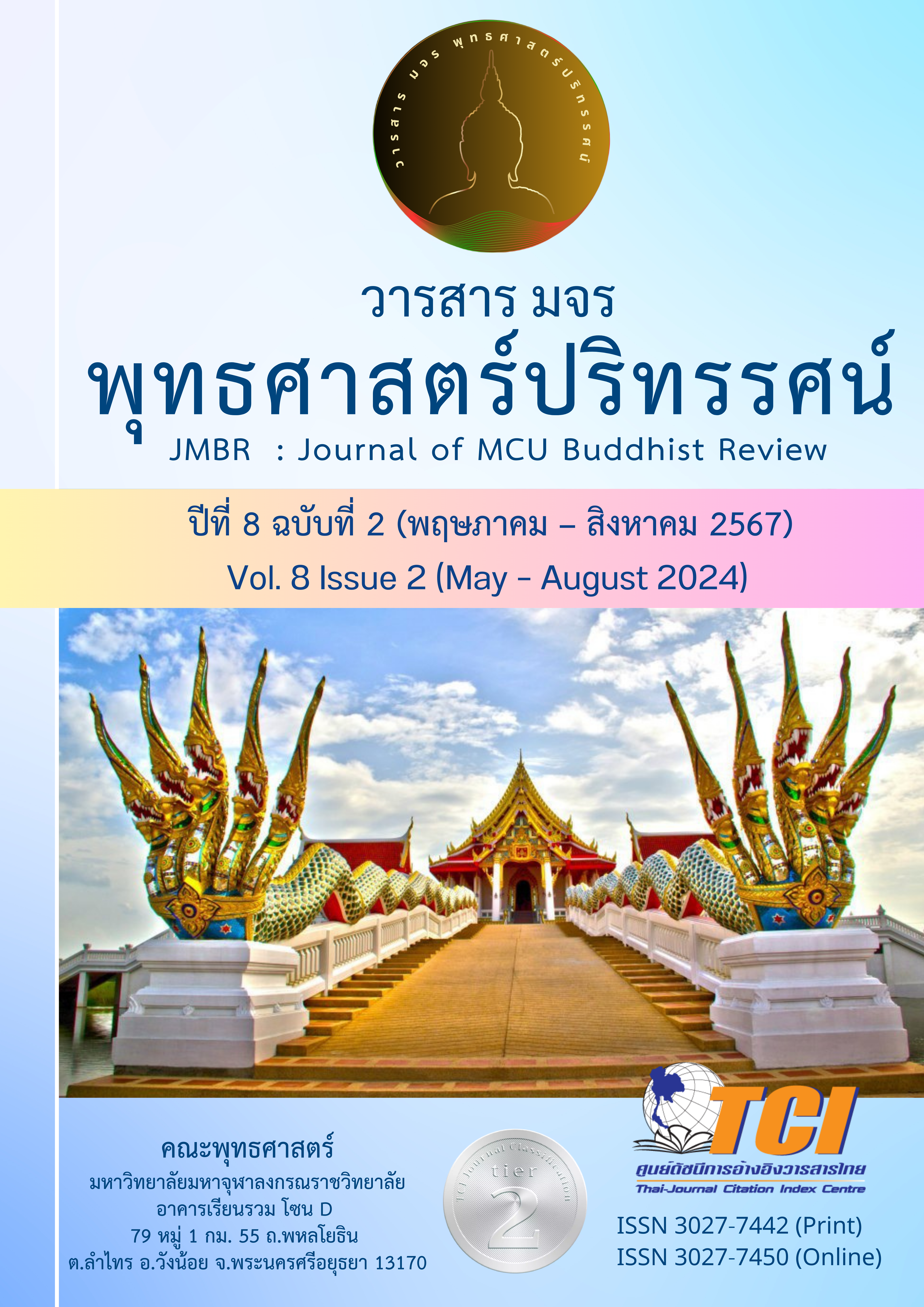การปรึกษาเชิงจิตวิทยาแบบออนไลน์ตามทฤษฎีเผชิญความจริง ต่อความเครียดสำหรับนิสิตระดับปริญญาตรี
Main Article Content
บทคัดย่อ
บทความวิจัยนี้มีวัตถุประสงค์ เพื่อศึกษาผลของการปรึกษาเชิงจิตวิทยาแบบออนไลน์ตามทฤษฎีเผชิญความจริงต่อความเครียดสำหรับนิสิตระดับปริญญาตรี จำนวน 5 คน มีคะแนนประเมินความเครียด ST-5 อยู่ในระดับมากที่สุด และมีความสมัครใจในการเข้าร่วมการปรึกษาเชิงจิตวิทยาแบบออนไลน์ตามแนวเผชิญความจริง เครื่องมือที่ใช้ได้แก่ 1) แบบประเมินความเครียด ST-5 2) แผนการปรึกษาเชิงจิตวิทยาแบบออนไลน์ตามทฤษฎีเผชิญความจริง 3) แบบสัมภาษณ์นิสิตที่เข้าร่วมการปรึกษาเชิงจิตวิทยาแบบออนไลน์ตามทฤษฎีเผชิญความจริง การวิเคราะห์ข้อมูล ได้แก่ การวิเคราะห์และแปลผลแบบประเมินความเครียดST-5 ทั้งก่อนและหลังด้วยแบบประเมินความเครียด ST-5
ผลการวิจัยพบว่า ผู้รับการปรึกษามีผลคะแนนจากแบบประเมินความเครียดลดลงกว่าก่อนเข้ารับการปรึกษาจากระดับความเครียดมากที่สุดลดลงไปที่ระดับเครียดน้อย นอกจากนี้ผลการวิเคราะห์เนื้อหาจากการสัมภาษณ์การปรึกษาเชิงจิตวิทยาแบบออนไลน์ตามแนวเผชิญความจริง พบว่า 1) ผู้รับการปรึกษาได้สำรวจความต้องการของตนเองในสิ่งที่เกิดความเครียดอยู่เกิดจากอะไร ในการนำสู่การวางแผนและตั้งเป้าหมายในการจัดการความเครียดที่เกิดขึ้น โดยที่ผู้รับการปรึกษาสามารถแก้ปัญหาที่จะต้องเผชิญต่อสภาพความเป็นจริง และตระหนักถึงความเป็นจริงว่าผู้รับการปรึกษามีหน้าที่ต้องหาทางจัดการความต้องการของตนเอง 2) ผู้รับการผู้รับการปรึกษาได้ฝึกในการปรับความคิดและพฤติกรรม ในการลดความเครียดลง สามารถที่จะแก้ปัญหาในปัจจุบันที่ผู้รับการปรึกษากำลังเผชิญได้อย่างถูกต้องและเหมาะสมในการดำเนินชีวิตประจำวัน 3) ผู้รับการปรึกษานำวิธีการในการเข้ารับการปรึกษาแต่ละครั้งไปประยุกต์ใช้ในการจัดการความเครียดของตนเอง ที่เกิดขึ้นในขณะศึกษาต่อ หรือเจอรายวิชาที่ยาก ก็สามารถที่จะยอมรับ เข้าใจ และจัดการปัญหาที่กำลังเผชิญได้ในด้านการเรียน
Article Details

อนุญาตภายใต้เงื่อนไข Creative Commons Attribution-NonCommercial-NoDerivatives 4.0 International License.
- บทความที่ได้รับการตีพิมพ์เป็นลิขสิทธิ์ของวารสาร มจร พุทธศาสตร์ปริทรรศน์
- ข้อความใดๆ ที่ปรากฎในบทความที่ได้รับการตีพิมพ์ในวารสาร ถือเป็นความรับผิดชอบของผู้เขียนบทความ และข้อคิดเห็นนั้นไม่ถือว่าเป็นทัศนะและความรับผิดชอบของกองบรรณาธิการวารสาร มจร พุทธศาสตร์ปริทรรศน์
เอกสารอ้างอิง
คณิติน จรโคกกรวด และ ลักขณา สริวัฒน์. (2565). การพัฒนาแอปพลิเคชั่นด้านสุขภาพจิตสำหรับการให้การปรึกษารายบุคคล แบบออนไลน์เพื่อลดความเครียดของวัยรุ่น. วารสารชุมชนวิจัยมหาวิทยาลัยราชภัฏนครราชสีมา. 16(3), 222-235.
ชัญญา ภาคอุทัย และ วรากร ทรัพย์วิระปกรณ์. (2558). ผลการปรึกษากลุ่มทฤษฎีเผชิญความจริงต่อการเรียนรู้ด้วยการนำตน ของนักเรียนชั้นมัธยมศึกษาปีที่ 6. วารสารวิทยาการวิจัยและวิทยาการปัญญา. 12(2), 81-91.
พระพรหมคุณาภรณ์ (ป.อ.ปยุตฺโต). (2549). สุขภาวะองค์รวมแนวพุทธ, กรุงเทพฯ: ธรรมสภา.
พระครูปลัดสัมพิพัฒนธรรมาจารย์ (ประเสริฐ มนุตเสวี). (2555). อานาปานสติภาวนา ลำดับการบรรลุธรรมของพระพุทธเจ้า, สมเด็จพระพุทธชินวงศ์ ตรวจชำระ. กรุงเทพฯ: ห้างหุ้นส่วนจำกัด ประยูรสาส์นไทย การพิมพ์.
วัชรี ทรัพย์มี. (2549). ทฤษฎีให้บริการปรึกษา. พิมพ์ครั้งที่ 4. กรุงเทพฯ: คณะจิตวิทยา จุฬาลงกรณ์มหาวิทยาลัย.
วรางคณา โสมะนันทน์, คาลอส บุญสุภา และ พลอยไพลิน กมลนาวิน. (2564). การให้บริการการปรึกษาเชิงจิตวิทยาแบบออนไลน์ : มิติใหม่ของการให้บริการปรึกษาเชิงจิตวิทยา. วารสารบัณฑิตศึกษา มหาวิทยาลัยราชภัฏวไลยอลงกรณ์ ในพระบรมราชูปถัมภ์. 2(1), 247-260.
สมเด็จพระพุทธโฆษาจารย์ (ป.อ.ปยุตฺโต). (2561). โยนิโสมนสิการ-วิธีคิดตามหลักพุทธธรรม. สืบค้น 7 กรกฎาคม 2566 จาก https://www.watnyanaves.net/th/book_detail/592
สุววุฒิ วงศ์ทางสวัสดิ์. (2559). ผลของการปรึกษาเชิงจิตวิทยารายบุคคลแบบออนไลน์ แนวอัตถิภาวนิยม-มนุษยนิยมต่อสุขภาวะของนิสิตนักศึกษาปริญญาตรีที่มีบุคลิกภาพแบบไม่มั่นคงทางอารมณ์. วิทยานิพนธ์หลักสูตรศิลปศาสตรดุษฎีบัณฑิต คณะจิตวิทยา: จุฬาลงกรณ์มหาวิทยาลัย
อรวรรณ ศิลปกิจ. (2551). แบบวัดความเครียดฉบับศรีธัญญา. วารสารสุขภาพจิตแห่งประเทศไทย. 16(3), 177-185.
Chertoff, J. D. et al. (2020). The early influence and effects of the coronavirus disease 2019 (COVID-19) pandemic on resident education and adaptations. Journal of the American College of Radiology, 17(10), 1322-1328.
Glasser, W. (1965). Reality therapy. New York: Harper & Row, Pub.


